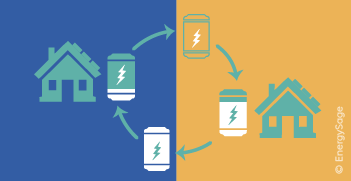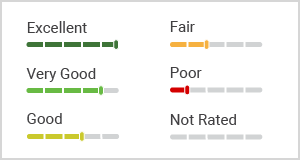Solar Batteries
Get Solar Quotes OnlineEnergySage Buyer's Guide: Solar Batteries
Browse solar batteries from top manufacturers on the EnergySage Buyer’s Guide. To learn about other solar energy system components, visit EnergySage's solar panel and solar inverter buyer's guides.
When you install a solar battery alongside a solar panel system, you can store extra solar electricity produced by your panels for later use after the sun goes down. Solar batteries provide numerous benefits and can lead to increased energy savings, especially for property owners in areas that experience time-variant electricity pricing or unfavorable solar compensation from the grid.
1
-
12
of 244
1
-
12
of 244
Solar battery buyer’s guide
There are many solar batteries available – how do you know which one is best for you? Some important aspects to consider when selecting a solar battery include cost, capacity, power, round-trip efficiency, degradation rate, and warranty. All of these aspects plus more are considered in each solar battery’s quality rating.
How solar batteries work
The primary function of a solar battery is to store energy produced by solar panels. that can be drawn on at a later time. Storing energy for later use provides many bonuses, from financial benefits to being a backup source of power in the event of a grid outage.
The main advantage of installing a solar plus storage energy system is that it gives you the ability to use solar electricity even when the sun isn’t shining. When you install a solar panel system without a battery, excess electricity that your system generates is sent back to the grid. With a solar battery, that energy can be stored and drawn on when the sun goes down, and you’ll only need to draw and pay for energy from the grid when your battery is depleted.
To learn more about how solar batteries work, check out our section on solar battery systems.
How to compare solar batteries
There are many ways to compare solar batteries. Here are a few key metrics to keep in mind:
Capacity & power
A battery’s capacity is the total amount of electricity it can store measured in kilowatt-hours (kWh). A battery’s power tells you the amount of electricity that it can deliver at one point in time measured in kilowatts (kW). It is important to consider both capacity and power when evaluating solar batteries. A battery with high capacity but low power can only provide a small amount of electricity at one time but can store enough energy to keep providing that electricity for long periods of time. On the flip side, a battery with low capacity but high power may be able to power many appliances or your entire home at one time, but potentially only for a few hours due to its low capacity.
Round-trip efficiency
Just like solar panels, solar batteries have efficiencies associated with them. A battery’s round-trip efficiency represents how much energy can be used as a percentage of the amount of energy that it took to store it in the first place. Batteries experience efficiency losses during the conversion of energy from storage to usable electricity, typically about 5 percent.
Battery life and warranty
Like cell phone batteries, solar batteries naturally degrade over time and will hold less overall charge the more you use them. Solar battery warranties are usually measured in cycles or years and guarantee the ability to hold a certain level of charge by the end of the specified warranty term.

Cost of solar batteries
The economics of adding a solar battery to a solar panel system can be complex. This is because the financial benefits of solar batteries depend on complicated factors like the type of electricity rate structure you are on, as well as more straightforward factors like sunlight hours, local electricity prices, and your energy use.
Many electric customers around the country are able to take advantage of net metering policies offered by their utilities, which allow you to store energy in the grid in exchange for electric bill credits. From a monetary perspective, the greatest benefits from solar batteries can be realized in areas where net metering policies either don’t exist or are more complicated than simple one-to-one crediting setups. Solar batteries also make economic sense in utility territories with time-variant electricity pricing. For example, if you live somewhere with time-of-use (TOU) rates, a solar battery can help you avoid paying higher electricity costs during certain times of the day.
Upfront costs of solar batteries depend on make and model, just like solar panels. Additionally, if you install a solar battery with a solar panel array, you can apply the federal investment tax credit (ITC) to your entire gross system cost to offset your cost. Beyond the federal ITC, there are some state-specific financial incentives available. The energy storage industry is still young, and as the technology spreads, expect more states, municipalities, and utility companies to consider implementing solar battery incentives.
The EnergySage solar battery rating system
The EnergySage classification system incorporates technical specifications for solar batteries to compare their performance, durability, warranty and overall quality. By assessing each product across a range of metrics, the EnergySage rating system groups equipment into five different classifications: Poor, Fair, Good, Very Good and Excellent.
Solar batteries rated as Poor or Fair are at the low end of what is currently available in the market, or may be outdated models no longer produced by manufacturers and rarely stocked by solar installation companies. Equipment receiving Good, Very Good or Excellent ratings must meet a baseline set of criteria rigorously developed so that you can be confident that your solar energy system will meet your needs.

Other solar battery resources
Choosing a battery: Learn about the best way to compare top solar battery products on the market from manufacturers like Tesla, LG, and Sonnen.
Tesla Powerwall review: The Tesla Powerwall is one of the most talked-about batteries available. Read our complete review.
Generac PWRcell review: Another popular home battery option is the Generac PWRcell. Read our complete review.
Energy storage glossary: There are plenty of terms to keep track of when talking about solar + storage, so we’ve put together a list of the most important ones to know.